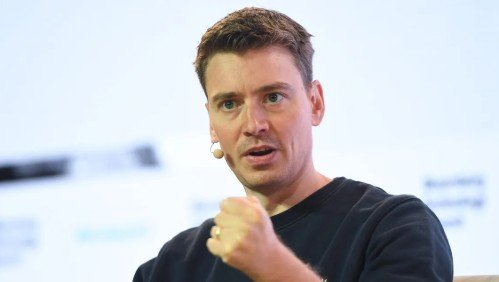Euan Blair: The Visionary Redefining Apprenticeships and Modern Education

Euan Anthony Blair was born on 19 January 1984 in London, England, into one of the most politically influential families in the United Kingdom. As the eldest son of former Prime Minister Tony Blair and renowned barrister Cherie Blair, Euan grew up under the public eye. Despite his parents’ prominence, Euan carved out his own professional identity rooted in innovation, technology, and education reform.
He attended St Joan of Arc Roman Catholic Primary School before moving to The London Oratory School, where he served as deputy head boy. His early education instilled discipline and leadership—qualities that would later underpin his entrepreneurial journey. Euan went on to earn a degree in Ancient History from the University of Bristol, followed by a master’s degree in International Relations from Yale University in the United States.
From Corporate Experience to Entrepreneurial Vision
After his formal education, Euan Blair gained hands-on experience across various sectors. He interned at the U.S. Congress, worked at the public relations firm Finsbury, and later joined Morgan Stanley’s graduate programme. This exposure to international business and policymaking gave him a strong understanding of how systems function at scale—particularly the gap between academic credentials and workplace readiness.
During this period, Euan became increasingly aware of the limitations of traditional university education. Many graduates, despite high tuition fees and years of study, struggled to find meaningful employment aligned with their skills. This realisation became the foundation for his next major move: creating an alternative pathway to success that focused on skills rather than degrees.
Founding of WhiteHat – The Birth of a New Educational Model
In 2016, Euan Blair co-founded WhiteHat, a company designed to bridge the gap between young talent and modern employers. The goal was simple yet revolutionary: replace outdated university models with professional apprenticeships that equip learners with real-world skills.
Under his leadership, WhiteHat partnered with major corporations to deliver structured learning and mentorship programmes. These apprenticeships offered participants a chance to gain qualifications while earning a salary, eliminating the need for student debt.
WhiteHat’s focus on inclusivity and equal opportunity made it stand out. It opened doors for individuals who lacked the financial means or academic privilege to attend elite universities, ensuring that talent—not background—became the main criterion for professional growth.
Evolution into Multiverse – Scaling the Vision Globally
WhiteHat rebranded to Multiverse in 2021, signalling the company’s global ambitions. The new name reflected Euan Blair’s belief in multiple paths to success, diverging from the singular academic trajectory traditionally promoted in society.
Multiverse quickly expanded to the United States, establishing partnerships with leading firms such as Google, Meta, and Microsoft. The company offered apprenticeships in fields like software engineering, data analysis, digital marketing, and project management.
By integrating advanced analytics and AI-driven insights into its platform, Multiverse ensured that learners received tailored training experiences aligned with both employer needs and individual career goals.
Rapid Growth and Financial Success
Euan Blair’s Multiverse soon became one of the fastest-growing education technology companies in Europe. The company’s success attracted major investors, including General Catalyst and Lightspeed Venture Partners.
In 2021, Multiverse raised $130 million in a Series C funding round, valuing the company at approximately $875 million. By 2022, a further $220 million investment pushed its valuation to over £1.7 billion, firmly establishing it as a unicorn in the EdTech sector.
Despite its rapid rise, Multiverse maintained a strong social mission—creating alternative pathways for thousands of learners. As of 2024, it had trained over 10,000 apprentices, many of whom transitioned into full-time roles in globally recognised companies.
Recognition and Accolades
Euan Blair’s impact did not go unnoticed. In 2022, he was appointed Member of the Order of the British Empire (MBE) for services to education. This recognition acknowledged his dedication to transforming how learning and employment intersect.
He was also featured in the Sunday Times Rich List, with an estimated personal net worth running into hundreds of millions of pounds—though he has often emphasised purpose over profit. To Blair, success is measured not by wealth but by the number of lives transformed through opportunity.
Philosophy: Education for the Future, Not the Past
Euan Blair believes the world of work is evolving faster than universities can adapt. The rise of artificial intelligence, automation, and data-driven decision-making requires new skill sets that traditional curricula rarely cover.
He argues that apprenticeships should no longer be viewed as secondary options but as primary vehicles for modern learning. Through Multiverse, Blair envisions a future where practical skills, mentorship, and lifelong learning replace outdated academic hierarchies.
His core message resonates with both students and employers: talent is evenly distributed, but opportunity is not. By democratising access to high-quality training, Multiverse aims to level the playing field.
Challenges and Criticism
Despite its acclaim, Multiverse has faced its share of scrutiny. Some critics argue that its success is partly attributed to Euan Blair’s family name. Others question the sustainability of its growth, given that the company reported a £40 million loss against £45 million in revenue during one financial year.
However, Blair remains transparent about the challenges. He explains that investment in quality training, expansion into new markets, and technology innovation naturally demand significant upfront spending. He maintains that long-term impact takes precedence over short-term profit.
Another challenge lies in changing public perception. Many societies still view university degrees as the gold standard of success. Blair’s mission, therefore, involves not just building a business, but reshaping cultural attitudes towards learning and employment.
The Broader Impact of Multiverse
Under Blair’s leadership, Multiverse has become more than an education company—it has become a movement. It champions diversity, equity, and inclusion by reaching candidates from underrepresented backgrounds and providing them with direct access to career-defining opportunities.
Employers benefit too. Through its programmes, companies gain access to skilled, motivated individuals who bring fresh perspectives and digital fluency. For governments and policymakers, Multiverse represents a scalable model for tackling unemployment and closing skills gaps in emerging industries.
Personal Life and Character
Though often compared to his father, Euan Blair’s journey reflects independence and innovation. He has deliberately avoided entering politics, choosing instead to create tangible social and economic impact through business.
Colleagues describe him as driven, empathetic, and relentlessly focused on results. His leadership style blends strategic vision with a strong sense of mission—a combination that has positioned him as one of the most influential voices in the future-of-work debate.
Outside of his professional life, Blair is known to maintain a relatively private lifestyle. He occasionally comments on issues related to education reform, technology, and the evolving nature of human work in an AI-driven economy.
Future Plans and Outlook
Looking ahead, Euan Blair intends to expand Multiverse’s footprint even further across Europe and North America. He envisions new programmes tailored to artificial intelligence, sustainability, cybersecurity, and advanced analytics—fields that are rapidly shaping the global job market.
He also aims to partner with governments and educational institutions to modernise apprenticeship frameworks. By aligning academic policy with industrial demand, Blair hopes to create a seamless ecosystem where learning directly fuels productivity and innovation.
As the digital economy evolves, his mission remains constant: to ensure that everyone, regardless of background, can access the skills they need to thrive.
Conclusion
Euan Blair stands as one of the most forward-thinking entrepreneurs of his generation. His company, Multiverse, has disrupted centuries of educational tradition by proving that ability, not academic prestige, defines success.
From the son of a prime minister to a global education reformer, Blair’s journey embodies purpose, persistence, and progressive thinking. As automation reshapes industries and AI redefines work, his vision offers a hopeful blueprint—one where opportunity is open to all, and education truly serves the future, not the past.



